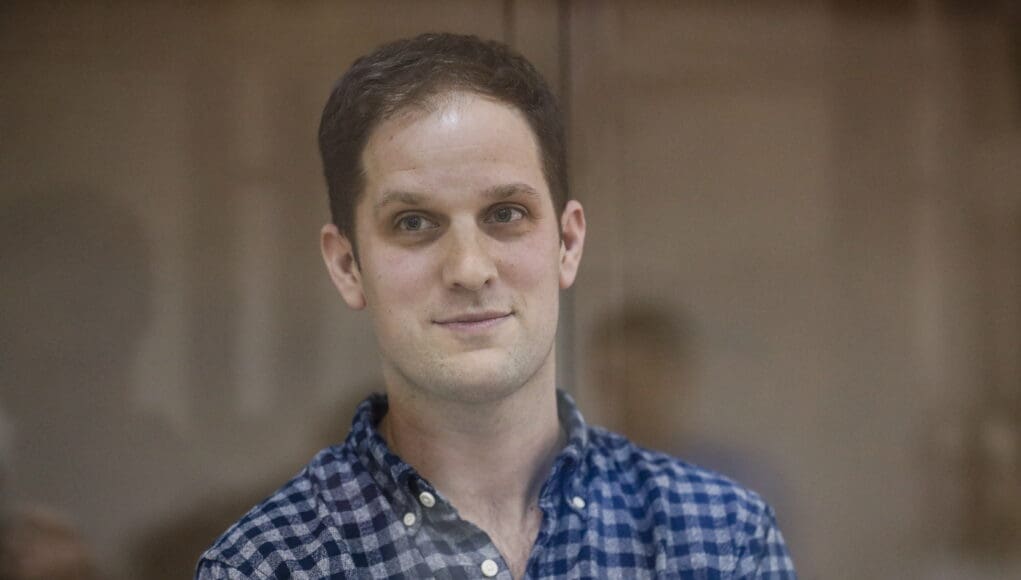[ad_1]
BEING a journalist isn’t a safe profession, and it’s particularly dangerous for those who work in countries such as Russia.
They run heavy risks, but they continue reporting because they know how important it is.
The Wall Street Journal’s Moscow correspondent, Evan Gershkovich, now awaiting trial for espionage, knows the country very well.
He has been based there for six years and he is the son of a Russian-Jewish couple who emigrated to the United States from the old Soviet Union.
Working in Russia for an American newspaper at a time of international tension is a worrying business.
But he has a deep love of the country and a strong desire to tell people what is really going on there.


Gershkovich was arrested in the city of Yekaterinburg, 900 miles east of Moscow.
It now seems he went there to write about the Russian war effort (not, as was at first reported, about the activities of Russia’s infamous mercenaries the Wagner Group).
It was an important and worthwhile story, exactly the kind of thing any foreign correspondent would do.
The Russian secret police, the FSB, will have watched him on to the plane from Moscow and followed him as he interviewed local people. Then they moved in to pick him up.
The FSB agents themselves may quite possibly have realised that he was just doing his job.
But the Kremlin wanted him arrested for spying and, ever since, Russian government ministers, together with Vladimir Putin’s powerful press secretary Dmitri Peskov, have been lining up to declare Gershkovich guilty.
Did Putin himself sign off on the arrest? We don’t know, but it’s hard to imagine something as major as this would have been done without his knowledge.
The fact is, Evan Gershkovich may have been picked up for a rather different reason.
Russia has been performing so badly in the Ukraine war that it can’t be sure how it will end.
Down the line, President Putin might find it handy to have some Western hostages to swap, maybe for Ukrainian PoWs or for some bigger deal involving Washington.
Over the past 13 years several American prisoners, some accused of spying, have been exchanged for genuine Russian agents held in the US.
At present there are two American hostages in Russia: Evan Gershkovich and former US Marine Paul Whelan, who has been held for four years without being exchanged.
The Kremlin’s attitude towards Western journalists started to get more hostile around 2012.
Before that there was still plenty of freedom and you could speak to government ministers relatively easily.
Little by little, the atmosphere has got frostier. Things were a lot better for journalists during the Cold War.
If the Soviet authorities gave you a visa to go to report there, it was an assurance that you would be allowed to work without being threatened with arrest.
In 1978, I went to Moscow and filmed a secret interview with the top political dissident Andrei Sakharov while he was under house arrest.
It made a big in- ternational splash and the Russians went crazy. They accused me of endangering world peace, but they didn’t accuse me of spying.
Their anger lasted precisely two years. On the anniversary of the interview they invited me to an official embassy function in London. No one ever mentioned it again.
Everything is different nowadays. Kremlin officials are much more open to Western influences, and they know very well that journalists aren’t spies.
But Putin needs to stir up anti-Western feeling, and the loudmouths who broadcast war news round the clock on Russian television are only too happy to pile on the accusations against someone like Evan Gershkovich.
Western journalists are spies if the Kremlin says they are, and the penalty can be up to 20 years in prison.
As a result, there are very few Western journalists left in Moscow nowadays, and their bosses in New York or London or Paris keep a constant eye on them to see if they should be pulled out.
Until the arrest of Evan Gershkovich it was as though the Russian government was happy to have a few Western correspondents on hand.
They knew what made the country tick and could be relied on to explain it calmly and rationally to the outside world. Gershkovich was one of that group, until his luck ran out.
The way a journalist works — interviewing people, taking notes, getting the odd photograph — can always be presented as spying.
At present it suits Putin to turn up the heat on Western governments, and so the tired old accusations of espionage are coming out.
In fact, Gershkovich was doing an important and necessary job. Of course he isn’t a spy.
He’s a professional journalist with an important job to do. Russia must free him at once.
[ad_2]
Source link






























![🏈 Funniest Job Search Super Bowl Commercials [2023]](https://theworktimes.com/wp-content/uploads/2023/02/rscb49-1-100x75.webp)
